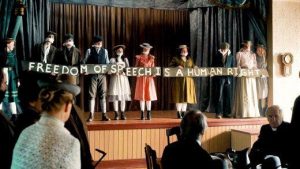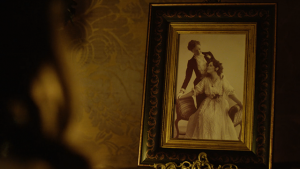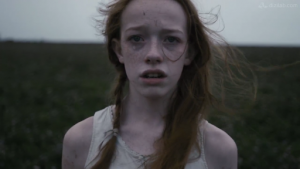The Canadian series Anne with an E produced by Netflix and the CBC has three seasons, much to the annoyance of many of its fans on November 25 of last year, just when the third season premiered, it was announced which would be the last. Fans of the series created a petition for the fourth season not to be canceled, the petition today reached one million people, who celebrate on Twitter under the hashtag ANNE ONE MILLION.
The successful series is an adaptation of the book «Anne of Green Gables«, and deals with the life of a small orphan girl, who is adopted by two brothers, Anne suffers from the social problems of the time, the 19th century, some still persist in our times.
7 social issues reflected in Anne with an E
1.- Freedom of speech
Anne is a young woman in the second season, together with her class they create a school newspaper, which is not well seen by the town authorities because it touches on topics such as sexism, a constant problem at the time. Anne also has feminist views that annoy the city church.

2.-Bullying
Little Anne suffers from bullying since the second episode when a neighbor questions her adoption for being «skinny and ugly«, this would not be the only time that Anne suffers from bullying since with the progress of the series discrimination becomes more acute the school, where she was harassed for being an orphan and coming from an orphanage, in addition to other causes, such as her way of dressing, thinking, speaking and even her physical appearance.
3.- Racism
The series also addresses slavery, the stigma that was borne by Afro-descendants who were not slaves, mistreatment and humiliation towards them, on the other hand, marginalization, and aggression towards indigenous societies, which were tricked into dispossessing their children. to evangelize them.

4.- Respect for LGBT communities
Although the series is set in the 19th century, Anne raises awareness about the mistreatment of the LGBT community at the time, something that unfortunately continues today, in addition to promoting respect, the series focuses on showing love between people of the same sex, as well as their qualities, leaving aside stereotypes.

5.- Gender equality
Prissy’s wedding is one of the many feminism scenes in the series, Anne’s young classmate at school was about to get married when her boyfriend reminded her that after the wedding she should leave school to dedicate herself to Housework, the young woman attended the wedding but did not marry, fleeing the place, leaving one of the most important release scenes in the series.

6.- Fight against sexism
Due to the setting of the series in the nineteenth century, we can easily recognize sexism and oppression of women’s rights, some parents of Anne’s classmates do not want their daughters to attend universities, they prefer the schools of Ladies, places where women learn household chores.
7.-Discrimination and classism
Young Anne, who is discriminated against by the villagers, is attacked by children and adults who judged her for having grown up in an orphanage. They are not the only ones attacking the girl, the school teacher also joins in with classy comments, making Anne’s life miserable, to the point that she thought about leaving school.
